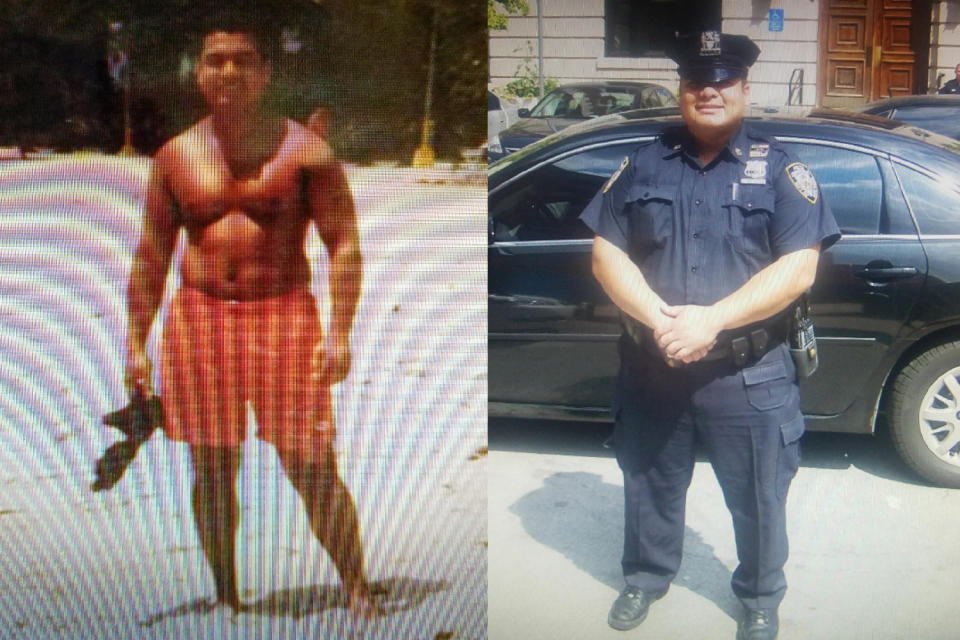How healthy are police? An ex-cop is suing the NYPD for his obesity

A court case filed in New York City early this week is highlighting a number of health issues affecting New York City police officers. Jose Vega, a 46-year-old retired police officer is suing the New York Police Department for additional pension funds. Vega claims his former job as a police officer in the Bronx not only caused his heart condition, but also brought on massive weight gain, causing him to be morbidly obese by the time he was effectively pushed out and ultimately retired in 2014.
When Vega left the force, he was given a 50 percent pension, but he is seeking a 75 percent pension due to the health condition he claims he acquired on the job. If he wins, he would receive $2,000 more a month in addition to the $4,000 monthly pension he now receives.
Vega contends that job-related stress and working conditions, coupled with a bad diet, brought on hypertension, starting in 2007. It was followed by irreparable heart damage, which Vega says also prevented him from being able to stay fit through exercise. All these factors led the formerly 180-pound officer to gain more than a hundred pounds in the year before he retired, maxing out at 395 pounds.
“This isn’t about about eating or exercise,” Vega told Yahoo Lifestyle. “It’s about the combination of factors around stressful working conditions. Sometimes working 40 hours straight with no sleep.”
Although police work may be characterized by danger, foot chases, and wrestling suspects to the ground, a lot of the job is spent sitting down. Factors like the stress of the job, notoriously bad eating habits, and long hours in police cruisers all brought on a heart condition called left ventricular hypertrophy, says Vega and his lawyer, Warren J. Roth. “The job is like a tyrant,” Vega told the New York Post. “The job would emphasize arrests without any concern for officer’s health.”
Vega has also been denied protection by the “Heart Bill,” a New York state stipulation that says if any law enforcement officer is suffering from a heart condition, it is to be presumed that the health issues were acquired in the line of duty. It’s the burden of the state and the Police Department, in this case, to prove otherwise. Vega’s case has been denied by the medical board, despite his private doctors saying that his case was within the purview of the heart bill.
Bottom line: Vega says that inescapable conditions of the job as a police officer caused him to go from being a 180-pound rookie cop to weighing 395 pounds by the time he left the force.

Another contributing factor to the doughnut-eating stereotype that haunts cops is that there are no annual or otherwise ongoing requirements for physical fitness for most police officers. Despite rigorous physical exams that one must pass in order to get hired as a rookie, those requirements are not enforced once the officer is in service. Typically, any ongoing physical tests are strictly voluntary, and paid bonuses or points toward promotions are offered to healthy officers who prove themselves. New York City and Chicago have such a program, where only 25 percent of the force partakes in the exams. Chicago police union reps surmise that the $350 bonus (before taxes) for the city’s fitness program may not be much of an incentive for cops to participate. Backing all this up, a 2014 study found that police officers are the most overweight workforce in the U.S., with a reported 41 percent of cops falling into the obese category.
Would more enforcement of physical requirements help maintain or improve the health of police officers? Certain police forces in the rest of the world seem to believe so. In recent years, police departments in the United Kingdom and Australia have begun to conduct annual physical exams.
As for Vega — the former Marine and ex-New York City police officer who is now retired and fighting a health condition and obesity — he’s been left to keep pushing for what he believes he deserves. “This isn’t about the money,” Vega says. “It’s about what I’m entitled to — If a doctor recommends you apply for this disability, what would you do? You’re not going to listen that recommendation?“
Read more from Yahoo Lifestyle
Exporting obesity: How the food industry is changing the world’s diet
Settled lawsuit allows NYPD officers to grow longer beards and wear turbans
Follow us on Instagram, Facebook, and Twitter for nonstop inspiration delivered fresh to your feed, every day.
